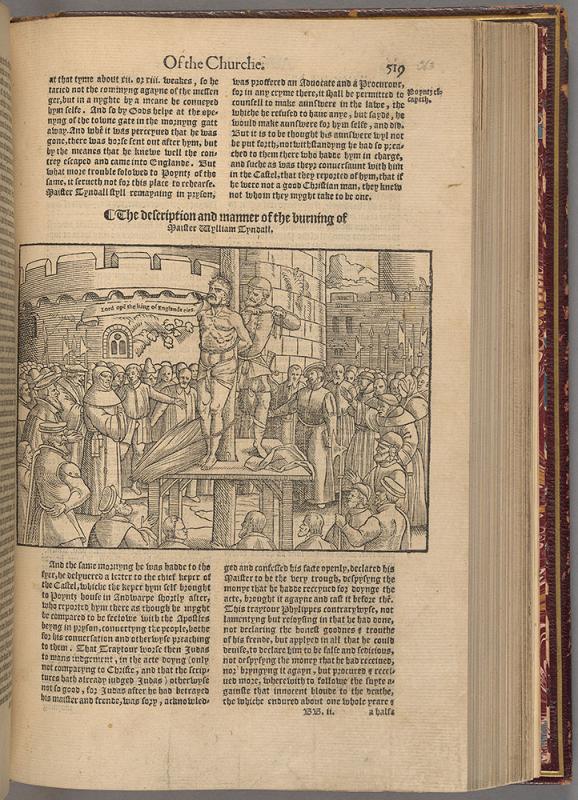
Actes and monuments ... touching matters of the church ..., Martyrdom of Tyndale, volume one of Foxe's Martyrs (1563) on page 519
Foxe, John, 1516-1587.
PML 7817-18
Jesse Erickson:
William Tyndale was an important figure in the history of Bible translation. In the early sixteenth century, Tyndale undertook the monumental task of producing an improved English translation of the Bible in English, following in the footsteps of Martin Luther and other influential translators of the time. His translations drew from Greek and Hebrew texts, resulting in powerful prose that can still be recognized in the King James Version.
Tyndale’s work, however, faced significant opposition. Tyndale made enemies with King Henry VIII, for instance, when he argued against his intent to seek an annulment of his marriage to Catherine of Aragon. Henry condemned Tyndale’s translations leading to their prohibition in England. Undeterred, Tyndale resorted to printing his Bible abroad and having it smuggled into his home country, defying the censors. The first edition of his translation’s Old Testament claimed to be the work of Hans Lufft, a printer known for his Luther Bibles, perhaps as a playful act of defiance.
Despite the risks involved, Tyndale persevered, releasing revised editions with thought-provoking exegesis that challenged established interpretations. His notes reflected his commitment to Protestant theology. The English authorities made attempts to negotiate with him, but these negotiations ultimately failed. Betrayed by the aristocratic Comptroller of the Customs, Henry Phillips, Tyndale was captured in Antwerp and subjected to a trial that led to his condemnation and, in 1536, his execution. Just before his death, he uttered the poignant words, “Lord, open the king of England’s eyes,” prominently featured in a woodcut that appeared in Foxe’s Book of Martyrs. A selection from this work reads:
So in like manner this traitor Philipps… with bringing master Tyndale into the hands of God’s enemies, took money of him under a color of borrowing, and put it into his bag, and then incontinent went his way therewith, and came with his company of soldiers which laid hands upon him as before, and led him. And about one whole year and a half after, he was put to death at Filford with fire.
